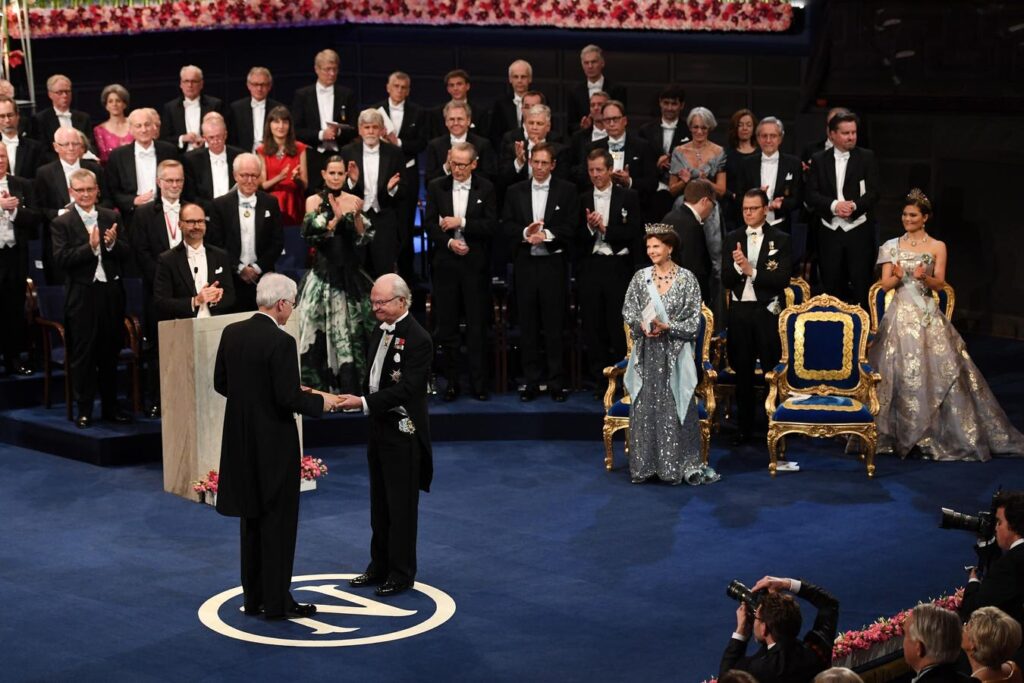Professor Bengt Holmstrom receives his Nobel Prize from King Carl XVI Gustaf of Sweden during the … [+]
As the world gears up for Monday’s announcement of the 2024 Nobel Prize in Economics, it’s worth reflecting on whether the prize still carries the same value it once did. While the Nobel is seen as the pinnacle of achievement in economics, it’s increasingly clear that the award has become less a measure of groundbreaking innovation and more a recognition of the same few familiar faces. The Nobel Prize in Economics has transformed into an insider’s club—a group dominated by a small network of elite universities, particularly within the U.S., and a coterie of scholars trained by a select group of influential economists.
Consider the example of Kenneth Arrow, one of the youngest economists to ever win the prize. Arrow’s contributions to general equilibrium theory and welfare economics earned him the Nobel in 1972, alongside John Hicks. But Arrow’s legacy extends far beyond his own work. Gerard Debreu, who co-developed general equilibrium theory with Arrow, was awarded the Nobel in 1983. Tjalling Koopmans, a mentor and colleague of Arrow’s at the Cowles Commission at the University of Chicago, won in 1975.
Arrow also mentored a number of students who would themselves go on to win Nobel Prizes, including John Harsanyi, who shared the 1994 award for his contributions to game theory. Roger Myerson and Michael Spence are two more Nobel laureates with connections to Arrow. Myerson was awarded the Nobel Prize in 2007. Spence won in 2001 for his work on signaling theory. Both were Arrow’s doctoral students.
Another notable example is Eric Maskin, a 2007 Nobel laureate alongside Myerson, known for his work in mechanism design theory, which continues the tradition of abstract, mathematically driven economic analysis that Arrow helped establish. Kenneth Arrow was Maskin’s PhD advisor at Harvard. Furthermore, Maskin’s influence extends through to his own students, including Jean Tirole who received the 2014 prize for his contributions to industrial organization. This multi-generational connection between Arrow, Maskin, and their Nobel-winning students underscores the tight-knit, insular nature of the economics profession.
This pattern highlights how the Nobel Prize has a tendency to reinforce pre-existing hierarchies within the profession. Research conducted on the affiliations of Nobel laureates shows that institutional concentration among economics Nobel winners is rising—increasingly dominated by places like Stanford, Harvard, MIT, and the University of Chicago. These institutions also produce a disproportionate share of the research that appears in the top journals, shaping the theories and models that are most widely taught.
Is this small circle of intellectual elite really the best representation of innovation in economics? Or has the Nobel Prize simply become a tool to perpetuate the influence of already dominant ideas? The recognition afforded by a Nobel Prize entrenches ideas within the mainstream, even when those ideas are questionable or the scientific autocracy proves unwise. Arrow himself is a case in point. His famous Impossibility Theorem, which proves mathematically that no system of collective choice (like voting) can satisfy certain somewhat arbitrary criteria, is an elegant solution to a highly theoretical problem. Its real-world importance is dubious, to say the least. Nonetheless, Arrow’s towering influence and his early recognition by the Nobel committee helped solidify this work as a foundation of modern welfare economics, making it difficult for critics to effectively challenge it.
Arrow’s work, along with that of his disciples, shaped not only the academic landscape but also policy decisions. Cost-benefit analysis, one of the core tools used by governments to evaluate public policy, draws heavily from welfare economics—a field that owes much to Arrow’s influence. Yet, as brilliant as Arrow may have been he was not infallible, but the Nobel Prize conferred upon him an aura of authority that made it difficult to challenge his conclusions. By the time Arrow passed away in 2017, his theories had become deeply entrenched, and his ideas—for better or worse—continue to dominate.
It’s no coincidence that many Nobel-winning theories are mathematically elegant but disconnected from the complexities of actual economies. The Nobel Prize often attaches a level of prestige to ideas that far outstrips their real-world applicability. This is precisely what Nobel laureate Ronald Coase meant when he wrote, “the degree to which economics is isolated from the ordinary business of life is extraordinary.” Such detachment from reality is not harmless. Friedrich Hayek, in his own Nobel acceptance speech, warned how “the pretense of knowledge” is particularly acute in economics, where the illusion of scientific precision can lead to disastrous outcomes.
At this point, the Nobel Prize in economics feels like it’s played out. The prize might have served a purpose in its early days by recognizing true pioneers of the field. But now, it’s mostly a mechanism for reinforcing established ideas, some of which have outlived their usefulness. In an increasingly complex and globalized world, the economics profession would benefit from looking beyond its traditional power centers and embracing more diverse perspectives. Economist Tyler Cowen argues Vitalik Buterin, the founder of the Ethereum
Ethereum
As it stands, the Nobel no longer serves the purpose of rewarding intellectual innovation—if it ever did. Instead, it has become a celebration of the same select group of thinkers who’ve dominated the field for decades. For some elites, it is just a matter of waiting their turn to receive the award. If economics is to truly evolve, the profession needs less of the Nobel’s insularity and more of the open-minded curiosity that should characterize any true science.
Read the full article here
